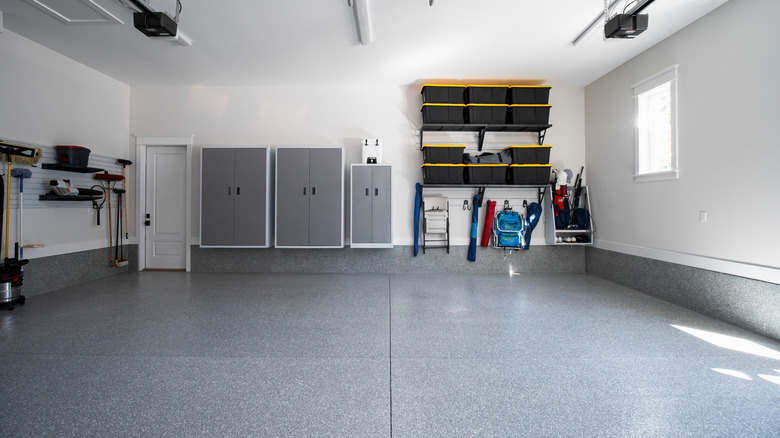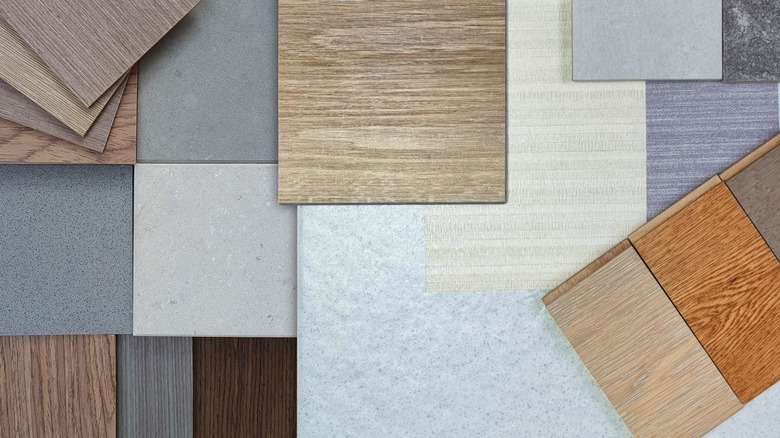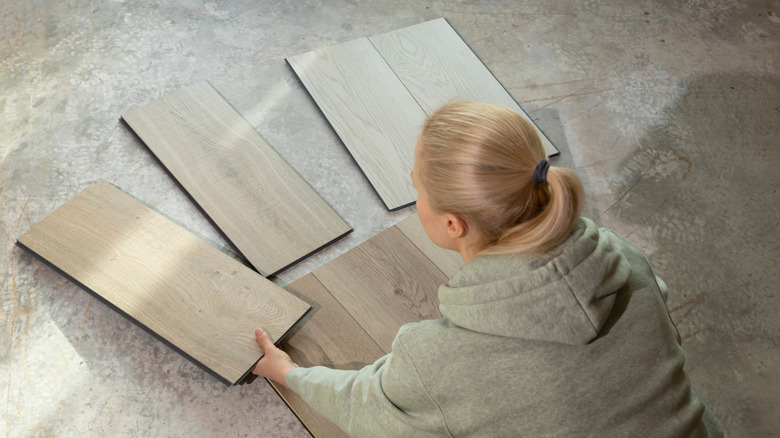Tired Of Concrete? Here's The Alternate Garage Flooring You've Been Looking For
There's a high chance that when you step into the garage of your new home, you'll be greeted by a floor made of plain old concrete. Concrete is the standard choice for garage flooring, and has been for a long while. It's a low-maintenance option that can serve you for years, thanks to its high durability and strength. However, concrete flooring has its downsides. They stain easily, absorb water, which can lead to mold and smells, and they can develop cracks that widen over time. Additionally, they're energy inefficient and not particularly aesthetically pleasing. While concrete stains and sealers are still flooring options to consider for your garage, how about going for something entirely different? Say vinyl flooring.
Vinyl flooring is an attractive alternative to the concrete floors that typically come with your garage. Made from polyvinyl chloride (PVC), this flooring option is known for its low cost of installation. It is also relatively easy to install on your own, allowing you to get out your DIY gloves and save some money on professional installation. Vinyl floors can be designed to mimic everything from wood planks to stone tiles, giving you a versatile option for creating any look you desire in your garage. Vinyl flooring is undeniably a great option for any room in your house, but what makes it great for your garage?
Why vinyl floors are a great option for garages
There are a few needs to assess before choosing a flooring option for garage usage, and vinyl flooring checks a lot of those boxes. First, your flooring option should be durable, because the garage is a perfect example of a high-traffic area. Vinyl floors are highly durable, which is definitely what you want for a garage floor that would carry the weight of your cars or any other heavy equipment stored in there. Garages are also exposed to a wide variety of chemicals and substances that can easily stain the floors, which is why stain-resistant vinyl floor tiles are a compelling alternative. Thanks to its stain-resistance, vinyl will come out on top against most stains like oils and grease. However, nothing is perfect, and while it will experience staining sometimes, vinyl is also easy to clean. There are many easy ways to clean vinyl floors and save yourself the headache.
Garage floors should be easy to install over your subfloor, and vinyl tiles tick that box. They can either come as peel-and-stick tiles or with a click-lock mechanism, and neither requires advanced DIY skills to install. This setup is great because it also makes replacing these tiles easy. You can simply replace a single tile when it gets damaged, rather than having to redo the entire floor. This significantly reduces repair costs. Finally, garage floors should be waterproof, as water can damage concrete subfloors and adversely affect the structural integrity of your home. Vinyl tiles are waterproof and can protect your subfloor from spills.
Things to note before installing vinyl flooring in your garage
The most important thing to note about vinyl flooring for your garage is that not all vinyl flooring is created equal. Some vinyl tiles or planks that are great options for your kitchen or other high-traffic areas simply aren't strong enough to take the weight of your cars or the heat of your tires. You have to find garage-rated VCT (Vinyl Composite Tiles) or PVC (Polyvinyl Chloride) tiles or mats. Ensure to ask your supplier if you can use the vinyl flooring option in your garage before purchasing it. The next thing to note is that vinyl floors expand and contract with temperature changes, and as such, need an expansion gap to prevent buckling and warping. They also don't do well against prolonged direct sunlight, so you might want to keep your garage door closed as much as possible.
Finally, you should be aware of the moisture content of your concrete subfloor. Now, vinyl flooring is waterproof, which means that you have nothing to fear from spills. However, it can be damaged by water seeping upwards from the subfloor. This moisture can wreak havoc on the adhesive of your peel-and-stick tiles and even cause mold growth and odors. Ensure to conduct moisture testing in your subfloor before installing your vinyl flooring. Another good garage flooring hack is to install a moisture-proof underlayment or barrier between the vinyl and subfloor. This will protect your vinyl floor from moisture damage, allowing it to last longer.


